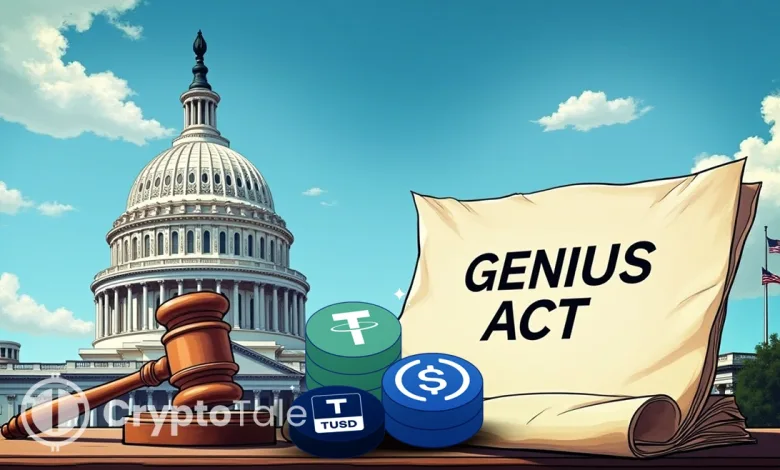U.S. Senate Approves GENIUS Act for Stablecoin Regulation

- The U.S. Senate passed the GENIUS Act with a 68–30 vote to regulate stablecoin issuance.
- Treasury says the Act will drive demand for U.S. Treasuries and support economic stability.
- The GENIUS Act could boost stablecoins into a $3.7 trillion market by the end of this decade.
The U.S. Senate has passed a groundbreaking piece of crypto legislation with broad bipartisan support. The GENIUS Act, focused on stablecoin regulation, cleared the chamber in a 68–30 vote on Tuesday. After months of negotiation and political setbacks, the bill now heads to the House.
The lawmakers from both parties supported the legislation. Eighteen Democrats voted in the affirmative while two representatives of the Republican Party voted against. The Act is seen as a major step forward for U.S. leadership in blockchain innovation and digital finance.
Senator Bill Hagerty introduced the bill six weeks ago. Republican Senator Cynthia Lummis and Senator Tim Scott also played key roles in advancing it. Coinbase’s Chief Policy Officer Faryar Shirzad called the passage a “massive step” for the crypto industry.
The GENIUS Act focuses specifically on regulating stablecoins. These digital assets are typically pegged to the U.S. dollar and backed by U.S. Treasuries. The bill lays the foundation for a national framework governing their issuance and custody.
The Treasury supports the bill, citing potential economic benefits. Treasury Secretary Scott Bessent said stablecoins could fuel demand for U.S. Treasuries. That demand could lower borrowing costs and help manage the national debt.
The stablecoin market could grow to $3.7 trillion by the end of the decade. This growth would support private innovation and improve access to the dollar-based economy. Bessent said the bill benefits the private sector, the Treasury, and global consumers.
Despite Senate approval, the bill may face hurdles in the House. The STABLE Act, a companion bill, is also under consideration. Lawmakers are expected to propose additional amendments before a final House vote.
Democratic concerns previously delayed the bill’s progress. Some lawmakers opposed it due to President Trump’s crypto connections. Trump’s family has holdings in World Liberty Financial, the issuer of the USD1 stablecoin.
Related: Scott Bessent: US-Backed Stablecoins Could Surpass $2T By 2028
The bill initially failed a cloture vote in May, but negotiators reached a compromise. The final version passed with more bipartisan support than expected. Now, attention shifts to the House, where Republicans hold a slim majority.
Trump’s AI and crypto advisor, David Sacks, voiced support for the bill in May. He said the president would back the legislation if passed by a Republican-controlled Congress. Meanwhile, lawmakers continue to push the CLARITY Act for digital asset rules.
If passed in both chambers, the GENIUS Act will reach President Trump’s desk. Its implementation would mark a major milestone in U.S. crypto regulation.




